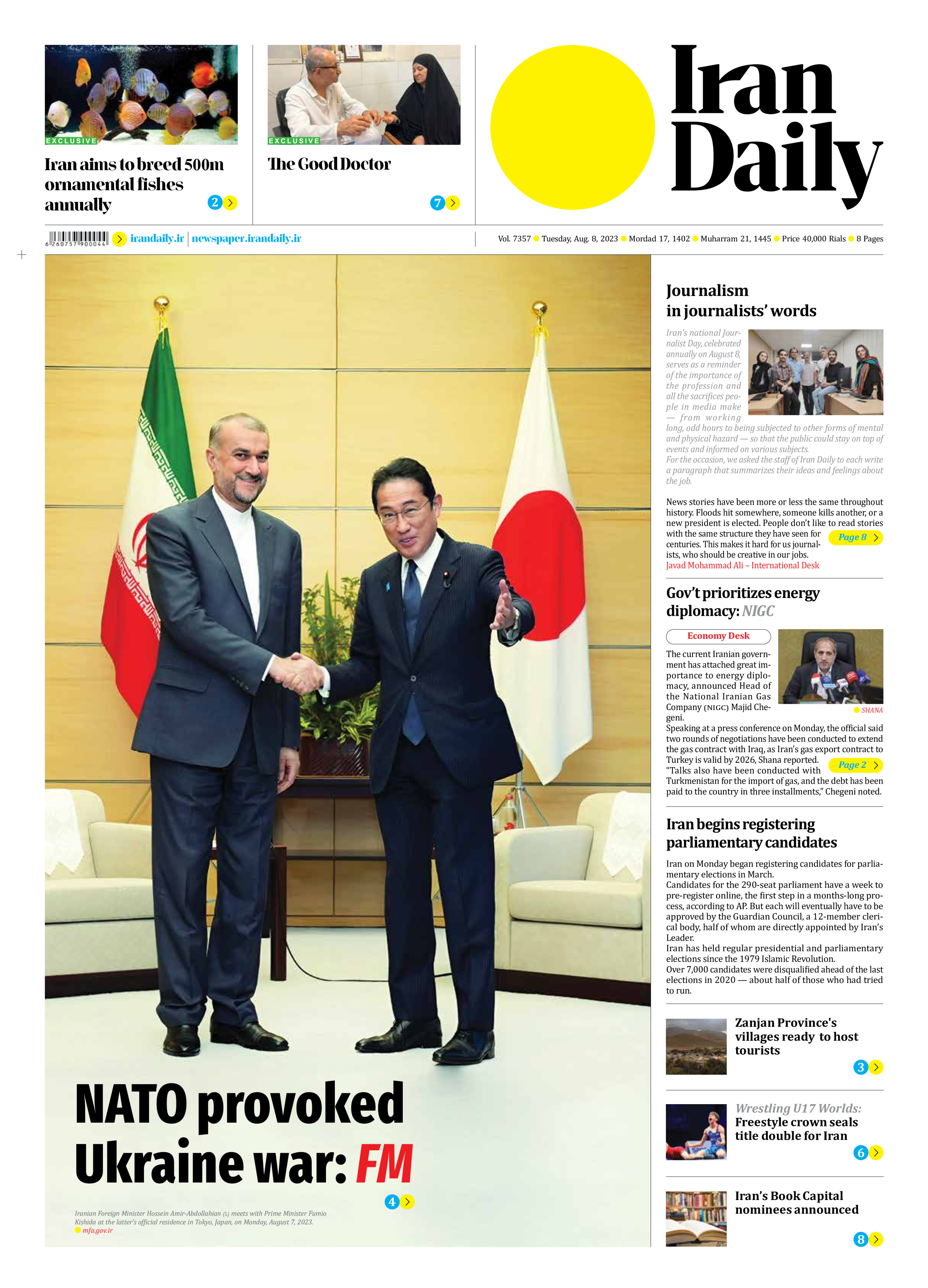
Journalism in journalists’ words
Iran’s national Journalist Day, celebrated annually on August 8, serves as a reminder of the importance of the profession and all the sacrifices people in media make — from working long, odd hours to being subjected to other forms of mental and physical hazard — so that the public could stay on top of events and informed on various subjects.
For the occasion, we asked the staff of Iran Daily to each write a paragraph that summarizes their ideas and feelings about the job.
News stories have been more or less the same throughout history. Floods hit somewhere, someone kills another, or a new president is elected. People don’t like to read stories with the same structure they have seen for centuries. This makes it hard for us journalists, who should be creative in our jobs.
Javad Mohammad Ali – International Desk
Similar to many media outlets worldwide, the political leanings of media owners can significantly impact the perspectives of journalists and their ability to freely express their thoughts and insights. This phenomenon often leads to a situation where news reporting might be influenced or biased based on the agendas of those who run the media. This can raise concerns about the objectivity and impartiality of the information presented to the public.
Zohreh Qanadi –
National Desk
Social media platforms, where users can share their own photos and footage of a newsworthy incident, are posing a major threat to professional journalism. While this phenomenon has its own pros as it gives leeway to people for sharing their firsthand opinions and breaks the monopoly of media giants, the cons could spell disaster for journalists, potentially vpushing many of them out of work. Adding to the issue, the rapid emergence of artificial intelligence is also rendering many media people useless.
Mostafa Shirmohammadi – Editor-in-chief
In Iran, journalists face several challenges, including the lack of media literacy, leading to the spread of fake news and a loss of credibility. The absence of a well-defined media system allows unqualified individuals to enter the field, hindering proper training and understanding of journalism. Moreover, the lack of a unified media system and strong regulation poses risks to the essence of journalism. Addressing these issues requires prioritizing media literacy, improving training programs, and establishing a strong regulatory framework to maintain the profession’s integrity and vital role in
society.
Hamideh Hosseini –
Arts & Culture Desk
When the esteemed Iranian journalist and famous constitutionalist Mirza Jahangir Khan – a.k.a. Jahangir Khan-e Sur-e Esrafil – was brutally murdered in the presence of the then king of Iran in June 1908, the dangerous nature of the profession was there for all to see. Although the incident dates back to more than 100 years, the recent savage killing of the Saudi Arabian journalist Jamal Khashoggi with knives and axes in October 2018 inside the kingdom’s consulate in Istanbul, Turkey, reiterates the solemnity of the dangers facing journalists everywhere. It all reminds me of a line by the revered 12th century Iranian poet Attar of Nishapur: “The man of the field must walk through pools of blood.” In 2022, Reporters Without Borders reported that between 2003-2022, around 1700 journalists worldwide were killed. If you add to this already horrific number those journalists who are in prison all over the world, the hardships of the job will be evident even more. All in all, journalism is a passion melded with never-ending excitement. The uttermost need of journalists is to provide them with safety.
Ebrahim Beheshti –
Staff writer
It’s been almost a decade that I’ve been working in print media – although it’s only a little more than a year that I’m a journalist per se. What urged me to pursue this career path was, first and foremost, my love for the written word and the power it holds in enlightening the mind and propagating knowledge. What civilization we humans have – at least for now – depends heavily on the written words of thinkers, researchers and investigators who did not settle for commonly accepted versions of truth, and, therefore, further expanded the boundaries of human understanding.
Ali Amiri –
Social Desk
It takes two tolls, being a news reporter. There’s the obvious troll under the bridge, demanding you to listen to and recount a never-ending list of tragedies and misfortunes just to give you a “safe” passage into the next day. And then, there’s a subtle toll you must pay for traveling with a companion who reminds you of all the times you crossed the same bridge on a loop that gets longer the more you stay in the business. Sometimes you just want to yell at your companion, “Yes, I know I’ve heard the same story before. Yes, I know little was done to fix it. And yes, I know I’ll probably hear it again someday. Would you get desensitized so I can keep working?” For those who ask, that’s how we get by. We get desensitized but still report the story with the same level of care and urgency so you, who are not hopefully bogged down by such metaphorical characters, won’t get desensitized.
Amir Mollaee Mozaffari – International Desk







